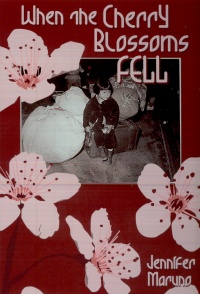| ________________
CM . . .
. Volume XVI Number 11. . . .November 13, 2009
The internment of the Japanese in Canada during World War II is one of our country's "dirty little secrets." As someone who lives in the Southern Interior of BC, it is heartening (in a sad way) to see internment museums or interpretation centres in many of our small towns. Beyond the borders of BC, I don't believe too many students are aware of what these Japanese families or business owners were subjected to. Jennifer Maruno has written a book that captures the experience of a nine-year-old girl named Michoko Managawa who was sent with her family to a small town outside of Nelson BC. It is March, 1942, and the government of Canada has ordered all Japanese men out of the city of Vancouver. They are sent to work camps to build roads and railroads throughout the province. Michoko's father, a travelling candy salesman, says good-bye to his family and disappears for a year. Michoko is not told where or why her father has left. The book details the new life of the Managawa family who are living in an unheated, derelict house so unlike the lovely home they left in Vancouver. The family is subjected to discrimination and racism in a number of different ways: slurs uttered under the breath of the townsfolk, outright jibes made by Michoko's fellow classmates, and total misconceptions of the Japanese race are presented. Michoko even pretends to be a girl of aboriginal descent, thinking this will help her fit in more easily at school. The details describing life lived throughout the seasons evoke rural life lived at a very slow pace. Readers see how Michoko's mother, aunt and grandfather learn to live frugally but still maintain a warm and loving household. Highly Recommended. Lizanne Eastwood is a Community Literacy Coordinator with the Columbia Basin Alliance for Literacy, a library employee and a home schooling parent of two active teenagers in Grand Forks, BC.
To comment
on this title or this review, send mail to cm@umanitoba.ca.
Copyright © the Manitoba Library Association. Reproduction for personal
use is permitted only if this copyright notice is maintained. Any
other reproduction is prohibited without permission.
NEXT REVIEW |
TABLE OF CONTENTS FOR THIS ISSUE
- November 13, 2009.
AUTHORS |
TITLES |
MEDIA REVIEWS |
PROFILES |
BACK ISSUES |
SEARCH |
CMARCHIVE |
HOME |
